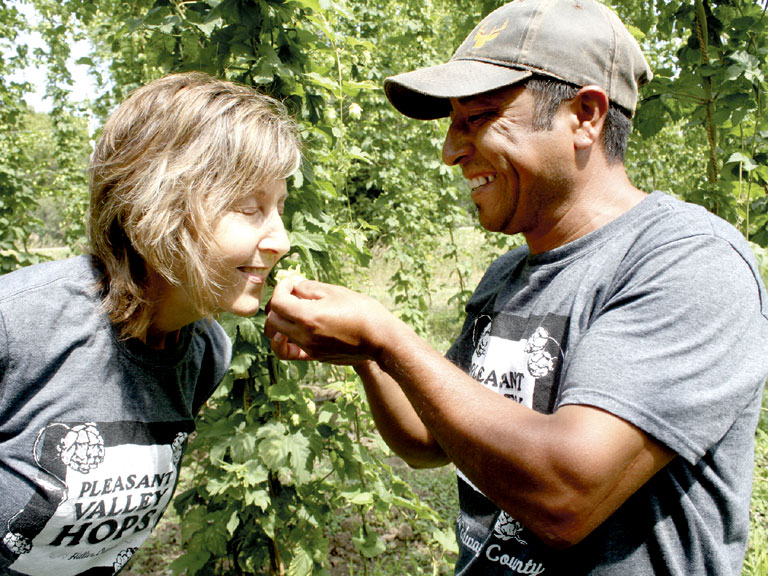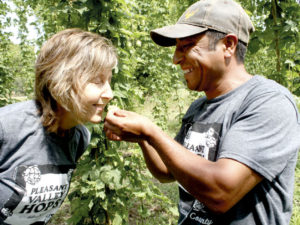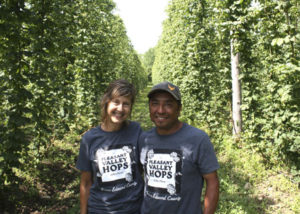County News
Hoppin’

Pleasant Valley Farms still hoping to crack the local market for hops
When we last checked in with Edgar Ramirez and Catherine Crawford at Pleasant Valley Hops (PVH) it was just as the craft beer boom was exploding in the County. PVH had then been open for five years, and although sales were coming in, the local beer community was still growing, and there were only a few breweries at that time. Of those, not many were looking for local hops. The hope was that with the influx of breweries coming to the area in the next few years, local sales would see a big boost. Fast-forward to 2019 and, as predicted, the brewery boom in the County is in full swing. New establishments like Matron Fine Beers in Bloomfield and Gillingham Brewery in Hallowell have just come on line, but are already seeing major business. The first wave of larger-scale breweries like Parson’s, 555 and Midtown are all seeing significant success in the their first years of operation.

Edgar Ramirez and his wife, Catherine Crawford, taking a moment before the harvest to smell the hops.
So, even after all these new breweries have opened their doors in the County, why are Edgar and Catherine still struggling with selling hops to the local market? There are quite a few ways to answer this, but most of it comes down to that the fact that brewers like to stick with what they know, and unfortunately that means that most of the time they buy American hops. Unlike wine, beer has no regulations on stating where the hops come from. In the wine world, in order for a wine to be labelled “PEC”, it must prove that the ingredients used in the product are from the County. In the beer world there are no such regulations, and the sad fact is that most County beers made here are not made with local hops. Crawford would still like to see a trend towards each brewery making a truly local beer with high-quality ingredients found right here in the County.
Over at PVH this season, the hops are about a week behind in their growing cycle, due to the abnormally cold spring. Usually, the farm would be harvesting next week, but now they are aiming at sometime around September 1 to harvest the hops. It’s been a challenging season for Ramirez. One of his blocks of hops has not turned out well at all due to a fungus called downy mildew, which essentially makes its way to the vine and stops it from growing. There is no rhyme or reason to it, as the block just metres away and across a small dirt road is flourishing and will be ready for harvest with the rest of the farm. The block affected by the mildew looks half the size of the rest of the hops, with only a few vines getting to the tops on the trellis.
The other healthy blocks are trying to soak in as much sun as possible before their vines are cut and sent to the giant sorting machine. The hops on the vine look healthy and hang like bells. Edgar grabs one, presses it between his hands and rubs them together. He then lowers his head, takes a long smell and explains what he is looking for.
“We are looking for them to get to a certain size, but we’re also looking for aroma. It has to smell a certain way before we can harvest. There is also a yellowy powder there inside the hops that has to mature into more of golden brown. The hops also have to be really oily and sticky in your hands before they are ready,” says Ramirez.
As for the remainder of the growing season, Ramirez is looking for some more rain.
“It seems to have rained everywhere in the County but in Hillier. That’s the crazy part of farming. Just a few kilometers away they are fine for rain. Here we definitely need more before we harvest,” says Ramirez.

Edgar Ramirez and Catherine Crawford standing in between the rows of hops at Pleasant Valley Hops.
In keeping with the tradition of everyone having at least two jobs in the County, PVH is also widely known for its vineyard maintenance abilities and has garnered a solid reputation as being to go-to people to setup and maintain County vineyards. PVH actually has a few acres of chardonnay as well, that they planted at the same time as the hops. The two have complementary growing seasons, with the hops being picked and sorted before any grapes come off the vines.
The hops that come from PVH are bright, floral and have an occasional surprise on the palate like pineapple or citrus. Some breweries, like Midtown and Parsons have started using PVH hops regularly. At Parsons, brewmaster and namesake Chris Parsons uses the PVH Chinook heavily as a bittering hop, so you’ll find it in the majority of their brews. Over at Midtown, Spike Lees uses it in his IPA and his English Ale series of beers that show up on smallbatch. Newcomers Matron Fine Beers is also a new client of PVF and is making a point of supporting local.
“Beers are locally brewed, but not always locally sourced. So, we are finding it a bit of a struggle to crack the local market. It’s all about getting the word out on our product and making sure people know they can buy high-quality hops right here in the County. Hops with a truly unique County profile,” says Crawford.
With all the experience that PVH has locally when it comes to farming and maintaining properties, you would think that a high-quality hop grown locally by them would fly off the shelves. Unfortunately, the beer industry may be new to this area, bit it still carries old traditions. Brewers buy their hops from places that are tried and tested and built on years of reputations. Getting into the inner circle is the biggest problem. Luckily PVH has a few friends and breweries spreading the word, and maybe their dream of every brewery in the County doing a purely local beer will come closer to reality.

Comments (0)